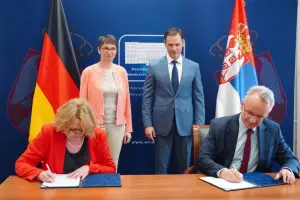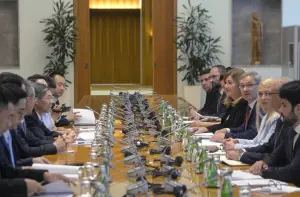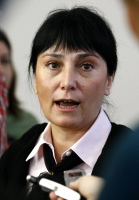- Serbia
Get to know Serbia
- Citizens
Culture and science
Health services
Pension and disability insurance
- Business
Employment
Economy
- Media
- Government
- Contact
Keep in touch
Contact form
Back
Keepin touch
Whether you have a question, comment, suggestion or any problem in the purview of the government, send us your message and we will try to respond as soon as possible. If your problem is not in our purview, we will forward your message to the relevant institution.
Q:
A:
Proposal to cut income tax under consideration
Belgrade,
12 April 2010
Finance Minister Diana Dragutinovic stated today that the tax policy reform includes a proposal to cut income tax and obligatory insurance contributions, which would encourage production and increase employment.
Speaking to the press at a presentation of the “Tax Policy – A Look Forward” study, she said that tax reforms should be speedy and not gradual, and implemented in one step in order to provide cheaper labour, encouraging employers to offer more jobs.
The sooner we begin, the bigger are our chances to encourage production and employment. Income tax cuts will be a huge relief for potential employers, she said.
Tax per RSD 100 net salary is nearly RSD 60. If the employers were to pay a maximum of RSD 149 instead of RSD 160, it would make a huge difference, said Dragutinovic.
Since the amount of taxation depends on the category of the employee, employers will be totally relieved of paying contributions for employees whose salaries are below RSD 16,500, which is the poverty line, she said.
She added that such a reform would be backed by employers, adding that its essence is the idea that the tax system should be reformed so as to endorse key elements, ie production, competition, economic growth and grey economy reduction.
The “Tax Policy – A Look Forward” study looks at the tax system change, aimed at increasing consumer tax and decreasing income tax in order to discourage consumption and reduce labour costs, Dragutinovic said, adding that the grey economy would thus be reduced and prices of products lowered.
USAID Director Michael Harvey said that good economic policy is crucial for macro economic balance, economic growth and new jobs.
Harvey said that compared to its neighbours, Serbia did well during the crisis, but its effects can still be felt.
When the market loses confidence in the government, it brings about a series of negative effects on the development of the entire state, he said adding that the study on future tax policy includes stimulating models to help the Serbian economy become competitive on the basis of increased production and decreased consumption.
The sooner we begin, the bigger are our chances to encourage production and employment. Income tax cuts will be a huge relief for potential employers, she said.
Tax per RSD 100 net salary is nearly RSD 60. If the employers were to pay a maximum of RSD 149 instead of RSD 160, it would make a huge difference, said Dragutinovic.
Since the amount of taxation depends on the category of the employee, employers will be totally relieved of paying contributions for employees whose salaries are below RSD 16,500, which is the poverty line, she said.
She added that such a reform would be backed by employers, adding that its essence is the idea that the tax system should be reformed so as to endorse key elements, ie production, competition, economic growth and grey economy reduction.
The “Tax Policy – A Look Forward” study looks at the tax system change, aimed at increasing consumer tax and decreasing income tax in order to discourage consumption and reduce labour costs, Dragutinovic said, adding that the grey economy would thus be reduced and prices of products lowered.
USAID Director Michael Harvey said that good economic policy is crucial for macro economic balance, economic growth and new jobs.
Harvey said that compared to its neighbours, Serbia did well during the crisis, but its effects can still be felt.
When the market loses confidence in the government, it brings about a series of negative effects on the development of the entire state, he said adding that the study on future tax policy includes stimulating models to help the Serbian economy become competitive on the basis of increased production and decreased consumption.
-
 Belgrade, 11 July 2025
Belgrade, 11 July 2025Potential for improving cooperation with Belarus in many areas
-
 Požega, 5 July 2025
Požega, 5 July 2025Section of Pakovraće - Požega highway officially opened
-
 Belgrade, 2 July 2025
Belgrade, 2 July 2025Technical specifications defined for Serbia-Hungary oil pipeline
-
 Belgrade, 30 June 2025
Belgrade, 30 June 2025IMF confirms Serbia successfully implementing all agreed reforms
-
 Belgrade, 27 June 2025
Belgrade, 27 June 2025Double Taxation Avoidance Agreement with Germany signed
-
 Kostolac, 25 June 2025
Kostolac, 25 June 2025Construction of Kostolac wind farm nearing completion
-
 Belgrade, 24 June 2025
Belgrade, 24 June 2025Government supports request for new postponement of sanctions against NIS
-
 Belgrade, 23 June 2025
Belgrade, 23 June 2025Procedures to facilitate sale of Serbian products to China to be accelerated
-
 Belgrade, 21 June 2025
Belgrade, 21 June 2025Serbia receives first funds under Growth Plan for the Western Balkans
-
 Belgrade/Cairo, 20 June 2025
Belgrade/Cairo, 20 June 2025New phase in relations with Egypt in field of agriculture

